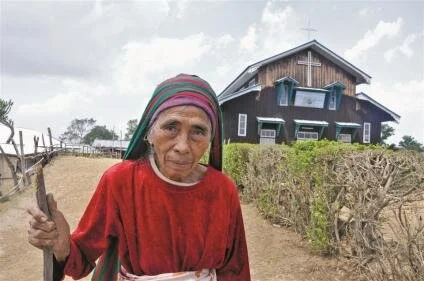Chin minority denied religious liberty
The primarily Christian, ethnic Chin community of western Myanmar claims they are being prevented from practicing their religion freely and are even forced to convert to Buddhism, according to a report released by a Chin human-rights watchdog.
The report, released by the Chin Human Rights Organization (CHRO), alleges that the ethnic Chin face coercion to exchange their religion for Buddhism. Buddhism is the state religion in Myanmar, also known as Burma.
Buddhism was introduced the first Prime Minister of Myanmar, U Nu, himself a religious man, in the early 1960s an established as the state religion. But several ethnic minorities in Myanmar, mainly Chin, Kachin, Karen, Karenni and ethnic communities in Shan State are Christians. An estimated 80 percent of ethnic Chin people are Christians.
Based on over 100 interviews over the last two years, September's report, titled Threats to Our Existence: Persecution of Ethnic Chin Christians in Burma, disclosed violations of freedom of religious assembly, coercion to convert to Buddhism and the destruction of Christian crosses in Chin State.
The CHRO also documented that local Burmese authorities in Chin State destroyed Christian crosses, while the Christian Chin were forced to help erect Buddhist pagodas and obligated to donate in Buddhist religious buildings. In its report, the CHRO recorded the destruction of 13 Christian crosses, 15 Buddhist pagodas or monasteries built with forced labor exacted from Chin Christians, and more than 40 incidents of torture or ill-treatment that targeted the Chin due to their religion and ethnicity.
One CHRO case study describes a 35 year-old Chin farmer in a village in the northern township of Tonzang. The farmer, who for security reasons asked to be named only Q, said that Burmese government army raided his village on 28 March 2010 and raped his wife.
“When I came back from my farm at around 6pm that day, there were four Burma Army soldiers at my home. They had raped my wife," Q recounted. "I believe they did that to bring shame on my family, and to disrupt my work as a lay preacher by causing scandal.”
“One of them tortured me. He beat me really hard with the butt of his gun,” he recalled.
Chin Christians had lodged an additional 24 official complaints of violations of religious freedom and other human rights abuses such as rape and extra-judicial killing at various levels of government where no action was taken against the alleged perpetrators.
British writer, Benedict Rogers, East Asia Team Leader of Christian Solidarity Worldwide (CSW), helped the CHRO for the report. Rogers said his organization also documented serious violations of freedom of religion or belief in recent years, and these violations continue today.
According to CRHO research, Christian Chin children are lured away from their families with the promise of education, forced to join military-run monastic schools, forced to shave their heads and to live as novice monks. As part of this forced conversion to Buddhism, they are forbidden to practice their Christian faith, according to Rogers.
“The violations of freedom of religion or belief, and the persecution of Chin Christians, are driven by the authorities, not by society,” said Rogers.
“It is part of a policy of assimilation, and a policy which is intolerant of non-Burmese ethnic minorities and non-Buddhist religious minorities,” he added.
Australian writer Constance Veronica Allmark wrote in her book Rebel of Burma that during U Nu's government, a Buddhist pagoda called Peace Pagoda was built in Myanmar commercial capital, Rangoon with public donations. Christians, Muslims and Hindus in Rangoon were all forced to donate to the construction of the pagoda, Allmark found.
The 2012 US Commission on International Religious Freedom (USCIRF) report also includes Myanmar in its list of “countries of particular concern” (CPCs), along with the likes of North Korea, Saudi Arabia, Turkmenistan and Vietnam.
The CHRO also said that, due to human rights abuses and persecution in Chin State, many Chin fled to neighboring countries. There are an estimated 50,000 Chin refugees in Malaysia, 12,000 in New Delhi, and as many as 100,000 Chin living in Mizoram, Northeast India, which borders Chin State.
Rogers pointed out that freedom of religion or belief, enshrined in Article 18 of the Universal Declaration of Human Rights, is an absolutely essential universal right and a key component of any democratic society.
“If Burma is serious about reform, it must end the policies of discrimination and persecution of religious minorities, and promote religious freedom for all,” said Rogers.
[Photo: An elderly Chin woman stands in front of her church. Image from CHRO archive.]

